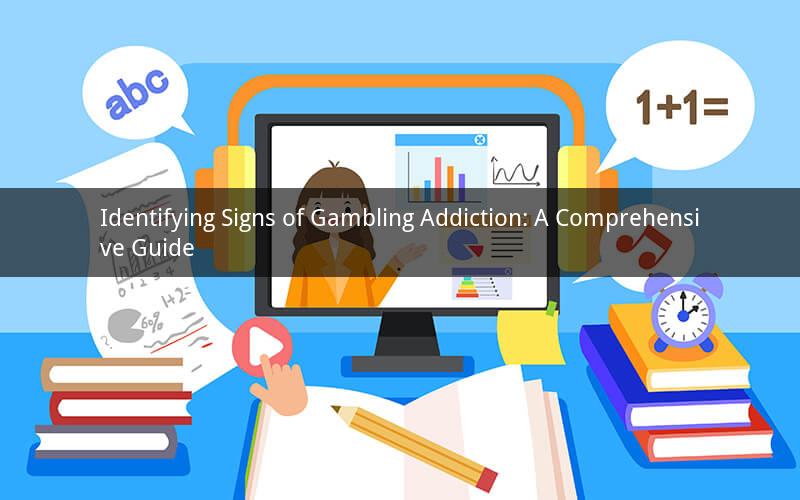
Introduction:
Gambling addiction is a complex issue that can significantly impact individuals and their families. Understanding the signs of gambling addiction is crucial for early detection and intervention. This article delves into the key indicators of gambling addiction, providing insights on how to recognize the signs and seek help if needed.
1. Uncontrollable Urges to Gamble:
One of the primary signs of gambling addiction is an uncontrollable urge to gamble. Individuals with a gambling addiction often experience intense cravings and feel the need to gamble frequently, despite the negative consequences it may bring. This compulsion can lead to neglecting personal responsibilities, work, and relationships.
2. Increasing Amounts of Money Spent on Gambling:
As the addiction progresses, individuals may start to spend increasingly larger amounts of money on gambling activities. They may go to great lengths to secure funds, including borrowing money, selling personal belongings, or even engaging in illegal activities. This financial strain can lead to financial difficulties and debt.
3. Loss of Control Over Gambling:
Gamblers with addiction often find it challenging to control their gambling behavior. They may set limits on the amount of time or money spent, but these limits are frequently disregarded. The inability to control gambling habits is a clear sign of addiction.
4. Withdrawal Symptoms When Not Gambling:
Individuals with gambling addiction may experience withdrawal symptoms when they are not gambling. These symptoms can include irritability, anxiety, and restlessness. The urge to gamble becomes even stronger during these periods, making it difficult for individuals to break the cycle of addiction.
5. Negative Impact on Relationships:
Gambling addiction can strain relationships with family, friends, and colleagues. Lying, cheating, and manipulating others to secure gambling funds are common behaviors observed in individuals with gambling addiction. The negative consequences of their actions may lead to conflicts, isolation, and the breakdown of relationships.
6. Neglecting Personal Responsibilities:
As gambling addiction worsens, individuals may neglect their personal responsibilities, including work, education, and family obligations. They may prioritize gambling activities over important life tasks, leading to decreased productivity, academic failure, or strained family dynamics.
7. Continued Gambling Despite Negative Consequences:
One of the most significant signs of gambling addiction is continuing to gamble despite the negative consequences. Individuals may realize the harm caused by their gambling but find it difficult to stop. They may even turn to more dangerous forms of gambling, such as high-stakes games or online betting, to satisfy their addiction.
8. Risk of Compulsive Behaviors:
Gambling addiction can be linked to other compulsive behaviors, such as substance abuse, shopping addiction, or eating disorders. Individuals with gambling addiction may engage in these behaviors to cope with the emotional and psychological pain caused by their addiction.
9. Emotional and Psychological Distress:
Gambling addiction can lead to significant emotional and psychological distress. Individuals may experience anxiety, depression, and mood swings. They may also experience feelings of guilt, shame, and despair due to the harm caused to themselves and others.
10. Denial and Denialism:
Denial is a common characteristic of gambling addiction. Individuals may deny the extent of their problem, blaming others or circumstances for their financial struggles. They may also downplay the severity of their addiction, making it difficult for them to seek help.
Conclusion:
Identifying the signs of gambling addiction is essential for early detection and intervention. By recognizing the indicators mentioned above, individuals can take the necessary steps to seek help and overcome their addiction. Support from family, friends, and professionals is crucial in the recovery process.
Questions and Answers:
1. Q: How can I determine if my gambling habits are normal or addictive?
A: If you find that your gambling habits are causing financial strain, affecting your personal and professional life, or leading to negative emotions, it is important to seek help and assess the severity of your addiction.
2. Q: Can someone become addicted to online gambling?
A: Yes, online gambling can be just as addictive as traditional forms of gambling. The convenience and accessibility of online platforms make it easier for individuals to develop an addiction.
3. Q: What is the most effective treatment for gambling addiction?
A: Treatment for gambling addiction can vary, but cognitive-behavioral therapy (CBT) and support groups like Gamblers Anonymous have proven to be effective. Professional help and a strong support system are crucial for recovery.
4. Q: Can gambling addiction be cured?
A: While there is no permanent cure for gambling addiction, it can be effectively managed through proper treatment and support. Recovery is a lifelong process, and individuals need to be vigilant about maintaining their sobriety.
5. Q: How can I help a loved one struggling with gambling addiction?
A: Support your loved one by providing a safe and non-judgmental environment. Encourage them to seek professional help and offer your support throughout their recovery journey. Remember, it is important to take care of yourself as well to avoid becoming overwhelmed.